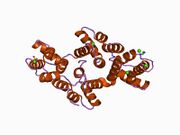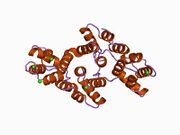آنكسين إيه 3
آنكسين إيه 3 (إنگليزية: Annexin A3، هو پروتين يتواجد لدى البشر يرمزه الجين ANXA3..[4][5]
يتم التعبير عنه بشكل غير طبيعي في أجنة كل من أطفال الأنابيب والحقن المجهري، مما قد يساهم في زيادة خطر الإصابة بعيوب خلقية في تقنيات الإنجاب المساعدة.[6]
يرمز هذا الجين عضوًا من عائلة الآنكسين. يلعب أعضاء عائلة الپروتين المرتبط بالدهون الفسفورية المعتمدة على الكالسيوم دورًا في تنظيم النمو الخلوي ومسارات نقل الإشارة. يعمل هذا الپروتين في تثبيط فسفوليباز A2 وانشقاق الإينوزيتول 1،2-فوسفات دوري لتشكيل إينوزيتول 1-فوسفات. قد يلعب هذا الپروتين أيضًا دورًا في مكافحة التخثر.[5]
. . . . . . . . . . . . . . . . . . . . . . . . . . . . . . . . . . . . . . . . . . . . . . . . . . . . . . . . . . . . . . . . . . . . . . . . . . . . . . . . . . . . . . . . . . . . . . . . . . . . . . . . . . . . . . . . . . . . . . . . . . . . . . . . . . . . . . . . . . . . . . . . . . . . . . . . . . . . . . . . . . . . . . . .
المصادر
- ^ أ ب ت GRCm38: Ensembl release 89: ENSMUSG00000029484 - Ensembl, May 2017
- ^ "Human PubMed Reference:". National Center for Biotechnology Information, U.S. National Library of Medicine.
- ^ "Mouse PubMed Reference:". National Center for Biotechnology Information, U.S. National Library of Medicine.
- ^ Tait JF, Frankenberry DA, Miao CH, Killary AM, Adler DA, Disteche CM (Aug 1991). "Chromosomal localization of the human annexin III (ANX3) gene". Genomics. 10 (2): 441–8. doi:10.1016/0888-7543(91)90330-H. PMID 1830024.
- ^ أ ب "Entrez Gene: ANXA3 annexin A3".
- ^ Zhang Y, Zhang YL, Feng C, et al. (September 2008). "Comparative proteomic analysis of human placenta derived from assisted reproductive technology". Proteomics. 8 (20): 4344–56. doi:10.1002/pmic.200800294. PMID 18792929. S2CID 206362532.
وصلات خارجية
- Human ANXA3 genome location and ANXA3 gene details page in the UCSC Genome Browser.
قراءات إضافية
- Ernst JD, Hoye E, Blackwood RA, Jaye D (1990). "Purification and characterization of an abundant cytosolic protein from human neutrophils that promotes Ca2(+)-dependent aggregation of isolated specific granules". J. Clin. Invest. 85 (4): 1065–71. doi:10.1172/JCI114537. PMC 296536. PMID 2138632.
- Ross TS, Tait JF, Majerus PW (1990). "Identity of inositol 1,2-cyclic phosphate 2-phosphohydrolase with lipocortin III". Science. 248 (4955): 605–7. Bibcode:1990Sci...248..605R. doi:10.1126/science.2159184. PMID 2159184.
- Pepinsky RB, Tizard R, Mattaliano RJ, et al. (1988). "Five distinct calcium and phospholipid binding proteins share homology with lipocortin I." J. Biol. Chem. 263 (22): 10799–811. doi:10.1016/S0021-9258(18)38041-4. PMID 2968983.
- Tait JF, Sakata M, McMullen BA, et al. (1989). "Placental anticoagulant proteins: isolation and comparative characterization four members of the lipocortin family". Biochemistry. 27 (17): 6268–76. doi:10.1021/bi00417a011. PMID 2975506.
- Tait JF, Smith C, Xu L, Cookson BT (1994). "Structure and polymorphisms of the human annexin III (ANX3) gene". Genomics. 18 (1): 79–86. doi:10.1006/geno.1993.1428. PMID 8276419.
- Sekar MC, Sambandam V, Grizzle WE, McDonald JM (1996). "Dissociation of cyclic inositol phosphohydrolase activity from annexin III". J. Biol. Chem. 271 (14): 8295–9. doi:10.1074/jbc.271.14.8295. PMID 8626524.
- Favier-Perron B, Lewit-Bentley A, Russo-Marie F (1996). "The high-resolution crystal structure of human annexin III shows subtle differences with annexin V.". Biochemistry. 35 (6): 1740–4. doi:10.1021/bi952092o. PMID 8639653.
- Bonaldo MF, Lennon G, Soares MB (1997). "Normalization and subtraction: two approaches to facilitate gene discovery". Genome Res. 6 (9): 791–806. doi:10.1101/gr.6.9.791. PMID 8889548.
- Cargill M, Altshuler D, Ireland J, et al. (1999). "Characterization of single-nucleotide polymorphisms in coding regions of human genes". Nat. Genet. 22 (3): 231–8. doi:10.1038/10290. PMID 10391209. S2CID 195213008.
- Bödeker H, Keim V, Fiedler F, et al. (2000). "PAP I interacts with itself, PAP II, PAP III, and lithostathine/regIalpha". Mol. Cell Biol. Res. Commun. 2 (3): 150–4. doi:10.1006/mcbr.1999.0166. PMID 10662590.
- Strausberg RL, Feingold EA, Grouse LH, et al. (2003). "Generation and initial analysis of more than 15,000 full-length human and mouse cDNA sequences". Proc. Natl. Acad. Sci. U.S.A. 99 (26): 16899–903. Bibcode:2002PNAS...9916899M. doi:10.1073/pnas.242603899. PMC 139241. PMID 12477932.
- Gevaert K, Goethals M, Martens L, et al. (2004). "Exploring proteomes and analyzing protein processing by mass spectrometric identification of sorted N-terminal peptides". Nat. Biotechnol. 21 (5): 566–9. doi:10.1038/nbt810. PMID 12665801. S2CID 23783563.
- Gerhard DS, Wagner L, Feingold EA, et al. (2004). "The status, quality, and expansion of the NIH full-length cDNA project: the Mammalian Gene Collection (MGC)". Genome Res. 14 (10B): 2121–7. doi:10.1101/gr.2596504. PMC 528928. PMID 15489334.
- Bruneel A, Labas V, Mailloux A, et al. (2006). "Proteomics of human umbilical vein endothelial cells applied to etoposide-induced apoptosis". Proteomics. 5 (15): 3876–84. doi:10.1002/pmic.200401239. PMID 16130169. S2CID 26007149.
- Stelzl U, Worm U, Lalowski M, et al. (2005). "A human protein-protein interaction network: a resource for annotating the proteome". Cell. 122 (6): 957–68. doi:10.1016/j.cell.2005.08.029. hdl:11858/00-001M-0000-0010-8592-0. PMID 16169070. S2CID 8235923.
- Park JE, Lee DH, Lee JA, et al. (2005). "Annexin A3 is a potential angiogenic mediator". Biochem. Biophys. Res. Commun. 337 (4): 1283–7. doi:10.1016/j.bbrc.2005.10.004. PMID 16236264.



